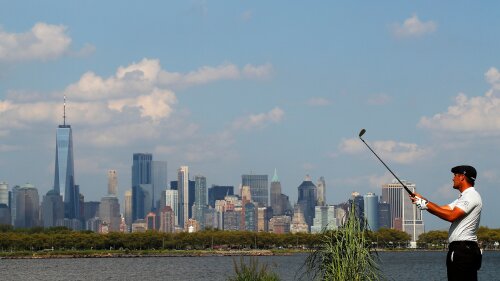For the uninitiated, last week’s kerfuffle over pace of play on the PGA Tour must have seemed like a wildly misguided waste of time.
Anyone who knows anything about golf knows that you can’t take more than two minutes to hit an 8-foot putt. You just can’t. And, to be fair, Bryson DeChambeau never attempted to justify his actions on the eighth green during the second round of last week’s Northern Trust. But he did attempt to plead his case in the court of public opinion and it didn’t go well. Social media and short attention spans don’t make for the best outlet and in many ways DeChambeau just made things worse.
“There are certain instances where we have a very difficult shot, and it’s not easy, so yeah, I’m going to take a little bit longer, because that’s my job,” he explained at Liberty National. “I’m trying to provide entertainment and I hope that people can realize that it takes more than just me playing a shot in 30 seconds or 40 seconds for us to call it slow play.”
While DeChambeau became an easy target for those suddenly polarized by slow play, it should be noted this isn’t a Bryson problem no matter how egregious his 2-plus-minute, 8-foot miss was - and it was egregious.
DeChambeau didn’t invent slow play and if we’re going by the letter of the law he didn’t even violate any rules or regulations on Friday.
According to the Tour’s pace-of-play policy, a player “is permitted” 40 seconds to hit a shot, but the stopwatch normally only comes out when a group has been deemed out of position and put on the clock. His threesome wasn’t put on the clock and there was no violation.
Under the policy, officials can begin timing a player who is determined “unreasonably slow” even if the group is not out of position, but that didn’t happen to DeChambeau.
Instead, DeChambeau took his sweet time, because he knew he could. He knew his group wasn’t on the clock and that there were no officials looming around with stopwatches.
“You can 100 percent guarantee that if that putt was filmed on the eighth yesterday and we were on the clock he wouldn’t take that amount of time,” said Tommy Fleetwood, who was grouped with DeChambeau for Rounds 1 and 2 at The Northern Trust. “If they know it’s allowed they will just do it when they can.”
The Tour’s own pace-of-play data proves this point. DeChambeau has been timed on four occasions this season and given just a single bad time, during Round 1 at the Memorial when he needed 82 seconds to hit his second shot on the fifth hole. That hardly paints a picture of a habitually slow player, but again, everyone involved concedes the policy really isn’t designed to either punish offenders or speed up play.
The Tour acknowledged as much on Sunday when the circuit announced a plan to review pace of play using ShotLink data to analyze different elements of slow play. For example, the Tour knows, thanks to ShotLink, that it takes 38 seconds to hit an average shot.
Shots around the green take the longest (51 seconds) while shots hit “on the green” take 33 seconds, on average. It is curious - and counterintuitive - that the Tour average actually goes up (39 seconds per shot) on the weekend when players are normally paired in twosomes, compared to Thursday and Friday (38 seconds) when they are grouped in threesomes.
What the Tour does with this information remains to be seen, but it seems as if they might be overthinking this. We can all agree the current policy doesn’t work, but do we really need a supercomputer crunching the numbers to find a fix?
Rory McIlroy didn’t.
“I think the guys that are slow are the guys that they get too many chances before they are penalized. It should be a warning and then a shot. It should be you’re put on the clock and that is your warning, and then if you get a bad time while on the clock, it’s a shot,” McIlroy said last week. “We are not children that need to be told five or six times what to do. OK, you’re on the clock. OK, I know if I play slowly here, I’m going to get penalized and I think that’s the way forward.”
DeChambeau became the unwitting poster child for slow play last week, but pace of play has been an issue on Tour long before the mad scientist added his own analytical twist to slow play. Bryson is an easy target at the moment, but he’s not the right target. The real culprit here is a policy that’s never worked.





